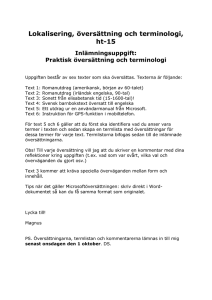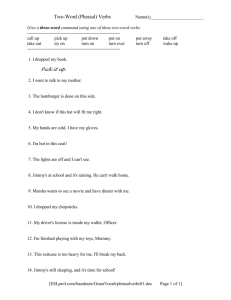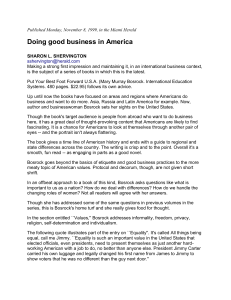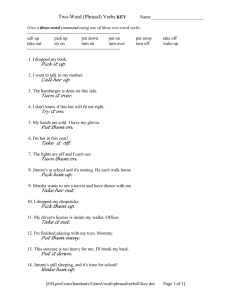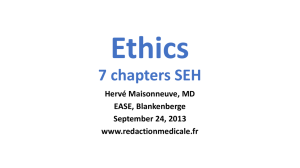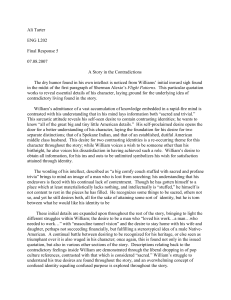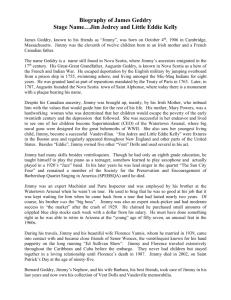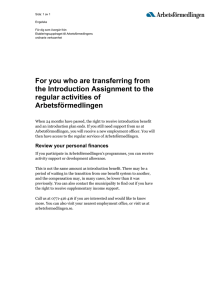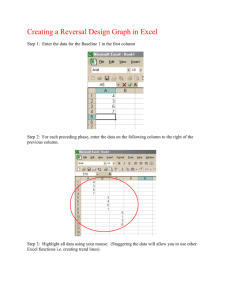What Is a Table?
advertisement
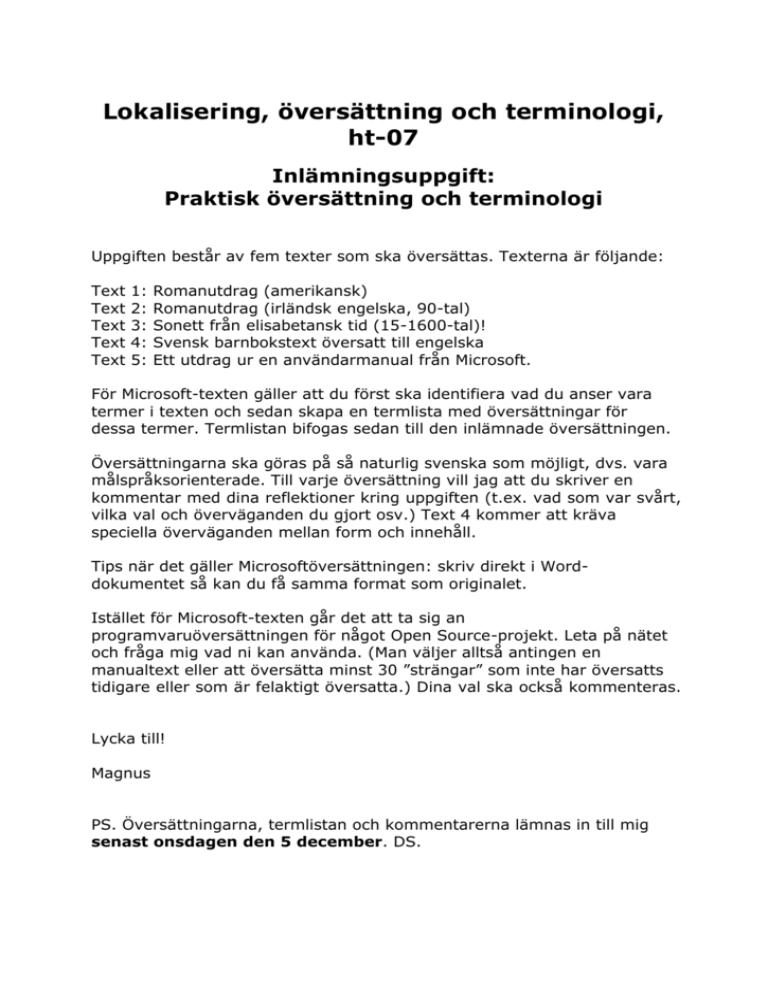
Lokalisering, översättning och terminologi, ht-07 Inlämningsuppgift: Praktisk översättning och terminologi Uppgiften består av fem texter som ska översättas. Texterna är följande: Text Text Text Text Text 1: 2: 3: 4: 5: Romanutdrag (amerikansk) Romanutdrag (irländsk engelska, 90-tal) Sonett från elisabetansk tid (15-1600-tal)! Svensk barnbokstext översatt till engelska Ett utdrag ur en användarmanual från Microsoft. För Microsoft-texten gäller att du först ska identifiera vad du anser vara termer i texten och sedan skapa en termlista med översättningar för dessa termer. Termlistan bifogas sedan till den inlämnade översättningen. Översättningarna ska göras på så naturlig svenska som möjligt, dvs. vara målspråksorienterade. Till varje översättning vill jag att du skriver en kommentar med dina reflektioner kring uppgiften (t.ex. vad som var svårt, vilka val och överväganden du gjort osv.) Text 4 kommer att kräva speciella överväganden mellan form och innehåll. Tips när det gäller Microsoftöversättningen: skriv direkt i Worddokumentet så kan du få samma format som originalet. Istället för Microsoft-texten går det att ta sig an programvaruöversättningen för något Open Source-projekt. Leta på nätet och fråga mig vad ni kan använda. (Man väljer alltså antingen en manualtext eller att översätta minst 30 ”strängar” som inte har översatts tidigare eller som är felaktigt översatta.) Dina val ska också kommenteras. Lycka till! Magnus PS. Översättningarna, termlistan och kommentarerna lämnas in till mig senast onsdagen den 5 december. DS. Text 1: It was still pretty early. I’m not sure what time it was, but it wasn’t too late. The one thing I hate to do is go to bed when I’m not even tired. So I opened my suitcases and took out a dean shirt, and then I went in the bathroom and washed and changed my shirt. What I thought I’d do, I thought I’d go downstairs and see what the hell was going on in the Lavender Room. They had this night club, the Lavender Room, in the hotel. While I was changing my shirt, I damn near gave my kid sister Phoebe a buzz, though. I certainly felt like talking to her on the phone. Somebody with sense and all. But I couldn’t take a chance on giving her a buzz, because she was only a little kid and she wouldn’t have been up, let alone anywhere near the phone. I thought of maybe hanging up if my parents answered, but that wouldn’t’ve worked, either. They’d know it was me. My mother always knows it’s me. She’s psychic. But I certainly wouldn’t have minded shooting the crap with old Phoebe for a while. You should see her. You never saw a little kid so pretty and smart in your whole life. She’s really smart. I mean she’s had all A’s ever since she started school. As a matter of fact, I’m the only dumb one in the family. My brother D.B.’s a writer and all, and my brother Allie, the one that died, that I told you about, was a wizard. I’m the only really dumb one. But you ought to see old Phoebe. She has this sort of red hair, a little bit like Allie’s was, that’s very short in the summertime. In the summertime, she sticks it behind her ears. She has nice, pretty little ears. In the wintertime, it’s pretty long, though. Sometimes my mother braids it and sometimes she doesn’t. It’s really nice, though. She’s only ten. She’s quite skinny, like me, but nice skinny. Roller-skate skinny. I watched her once from the window when she was crossing over Fifth Avenue to go to the park, and that’s what she is, roller-skate skinny. You’d like her. I mean if you tell old Phoebe something, she knows exactly what the hell you’re talking about. Text 2: --No. -- Ah but, Mammy – --No, I said. --Daddy --? --Yeh heard your mammy, said Jimmy Sr. --But— --No buts. The twins, Linda doing all of the talking, had just asked if they could get a new video for Christmas. They’d had none in the house since Jimmy Jr, the eldest, had taken his with him when he moved out a few months ago. --No buts, said Jimmy Sr. –We can’t afford it, an’ that’s that. And, we’ve no place to put it – --With the telly – --Don’t interrupt me, righ’! He was really angry, before he knew it; nearly out of his seat. It was happening a lot these days. He’d have to be careful. He stopped pointing at Linda. --We’re not gettin’ one; end o’ story. Now I want to enjoy me dinner. For a change. Linda raised her eyes to heaven and shifted a bit in her chair, and thought about walking out of the kitchen in protest, but she stayed. She was hungry. So was Gina, Sharon’s little young one. --Shut up, Sharon told her. –Wait. She put the chips in front of Gina, then lifted them away. --Now, if yeh throw them around, Sharon warned her, -- I’ll take them back off yeh, d’ye hear me? Gina screamed. --An’ Gradad’ll eat them on yeh. Isn’t tha’ righ’, Grandad? --Wha’? said Jimmy Sr. –Chips, is it? Come here, I’ll eat them now. He leaned over to Gina’s chair. --Give us them here. Lovely. Gina screamed, and grabbed the plate. Sharon managed to keep the chips on the plate but got ketchup on her hand. --Ah, bloody – --Buddy! said Gina. Sharon wiped her hand on Gina’s bib. All of them got dug into their dinners. Lovely, said Jimmy sr. Tracy had an announcement. --There’s a piece o’ paper hangin’ up in the toilet an’ yis are all to put a tick on it every time yis flush the toilet. --Wha’? said Jimmy Sr. Darren came in. --Good man, Darren, said Jimmy Sr. –Were ye watchin about’ the Berlin Wall there? --Yeah, said Darren as he sat down. --Terrific, isn’t it? said Jimmy Sr. --Yeah, said Darren. Jimmy Sr. wondered, again, why Darren wouldn’t talk to him properly any more. --Darren, said Tracy. –Every time yeh flush the toilet you’re to put a tick on the paper hangin’ up on the wall. --What’s this abou’? Jimmy Sr still wanted to know. --There’s a biro for yeh to do it in the glass with toothbrushes, Tracy told them. --Okay, said Darren. --Hang on, said Jimmy Sr. What are we to do? Exactly. Tracy raised her eyes. --Jesus, she said to Linda. --Don’t Jesus me, you, said Jimmy Sr. –An’ anyway that’s a curse. Swearbox. --It’s not a curse, said Tracy. –It’s a name. --Not the way you said it, said Jimmy Sr. He picked up the marmalade jar with the slit in its lid and rattled it in front of her. The swearbox had been his idea, to force him to clean up his act in front of the baby. --Come on, he said. --I haven’t anny money, said Tracy. Yeh have so, said Linda. --Fuck – --Ah ah! said Jimmy Sr. –Double. Veronica took over. That’s the last time you’ll use language like that in this house she told ‘Tracy. –D’you hear me? And you as well she told Linda. --I didn’t say ann’thin’! said Linda. --You know what I mean, said Veronica. – It’s disgraceful; I’m not having it. In front of Gina. Text 3: En berömd sonett med formatet abab-cdcd-efef-gg. Blankvers, tio stavelser per rad med rim! Gör ett eget försök! Shall I compare thee to a summer's day? Thou art more lovely and more temperate: Rough winds do shake the darling buds of May, And summer's lease hath all too short a date: Sometime too hot the eye of heaven shines, And often is his gold complexion dimmed, And every fair from fair sometime declines, By chance, or nature's changing course untrimmed: But thy eternal summer shall not fade, Nor lose possession of that fair thou ow'st, Nor shall death brag thou wander'st in his shade, When in eternal lines to time thou grow'st, So long as men can breathe, or eyes can see, So long lives this, and this gives life to thee. Text 4 En svensk berömd barnbokstext som ni nu får i amerikansk översättning. Gör den svensk igen. One beautiful afternoon Pippi had invited Tommy and Annika to her house for tea and gingersnaps. She set the tea things out on the steps of the front porch. It was sunny and pretty there, and the flowers in Pippi’s garden smelled sweetly. Mr Nelson climbed up and down the porch railing, and now and again the horse would stick his nose forward expecting to be offered a ginger-snap. “How lovely it is to be alive!” said Pippi, stretching her legs out as far as they would go. Just then two policemen in full uniform came in through the gate. “Oh!” said Pippi. “This must be my lucky day, too! Policemen are the very best thing I know. Except for strawberries and cream.” Text 5 Teknisk översättning Table Basics Whether you store a few phone numbers or thousands of records for a company database, you store your data in tables. For example, a table that contains a phone list might contain names and phone numbers. Before creating other objects for your database, such as queries or forms, you must create tables. This chapter explains how to design a table to store your data. It also explains how to create relationships between the tables you create, so that Microsoft Access can relate data in queries, forms, and reports. What Is a Table? A table is a container for data about a particular subject, such as employees or invoices. Each record in a table contains information about an individual thing, such as a specific employee. The records in a table are made up of fields, such as names and phone numbers. You can have many tables in your database, each storing information about a different subject. Each table can contain data of many types, including text, numbers, dates, and pictures. These are common examples of tables you might create: Mailing list containing your company’s customers and their addresses. Schedule containing dates, times, and locations of meetings or events. Catalog of items you sell, including prices and pictures for each item. Table containing results of scientific experiments. Reference table of tax rates or freight costs. Inventory of equipment or stock on hand. If you are designing a large database with many tables, you should plan your database carefully to avoid making too many changes later. For information on planning your database, see Chapter 2, “Designing a Database.” Creating a Table When you first create a table, it is an empty container for data. You design the table to contain the specific type of data you want to store, such as names and addresses. After you save your table, it’s ready for you to enter data. The easiest way to create most common tables for business or personal use is with the Table Wizard. With the Table Wizard, you can choose from specific table types such as business contacts, household inventory, or medical records. The Table Wizard asks you questions about the fields you want in your table, then creates the table for you. You can also create a table on your own without using the Table Wizard. To create a table with the Table Wizard 1. In the Database window, click the Table button (or choose Tables from the View menu). 2. Choose the New button. Microsoft Access displays the New Table dialog box. 3. Choose the Table Wizards button. 4. Follow the directions in the Wizard dialog boxes for adding fields to your table. When you’re finished creating your table, you can select an option in the Table Wizard to open the table in either Design view, to view or modify the table’s design, or Datasheet view, to begin entering data in the table. You can also select an option to create a new form for viewing data in the table. Note You can customize the Table Wizard using the Add-In Manager. (From the File menu choose Addins, and then choose Add-In Manager. Select Table Wizard and then choose the Customize button.) For more information on add-ins, see Chapter 3, “Starting Up and Managing Database Objects.” To create a table without the Table Wizard 1. In the Database window, click the Table button (or choose Tables from the View menu). 2. Choose the New button. Microsoft Access displays the New Table dialog box. 3. Choose the New Table button. Microsoft Access opens a blank Table window in Design view. Note You can also create a table by importing data, or you can attach an external table to your database. For example, if you have data in another application, such as dBASE or Paradox, you can use the Import command to create a Microsoft Access table for this data. For information on importing or attaching data, see Chapter 9, “Importing, Exporting, and Attaching.”
